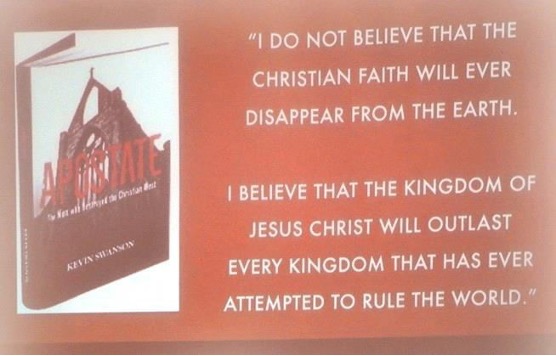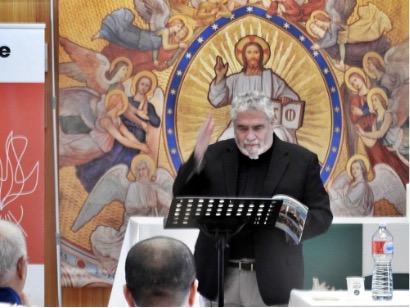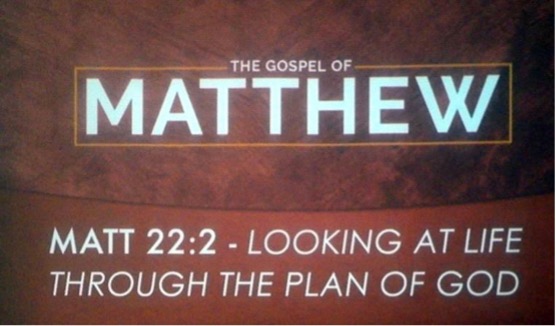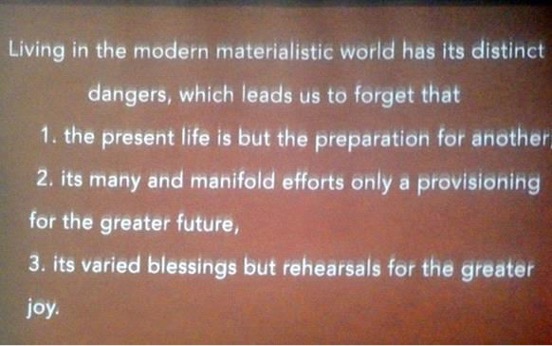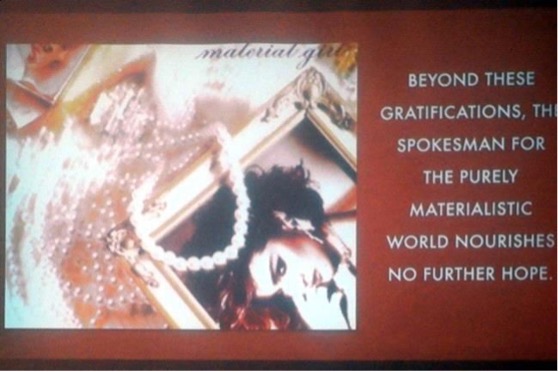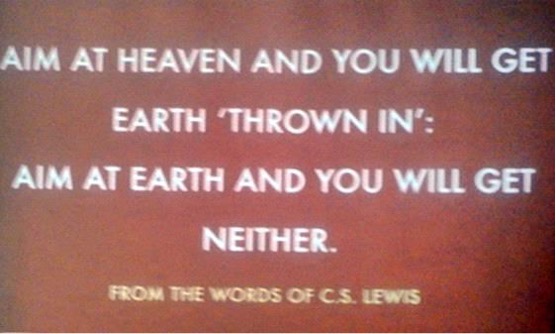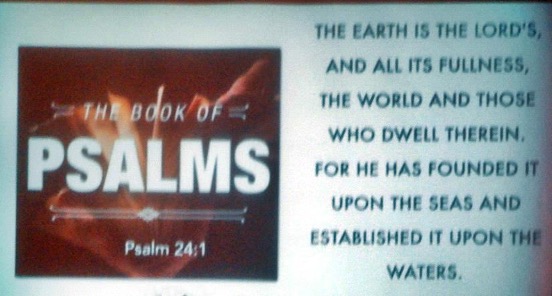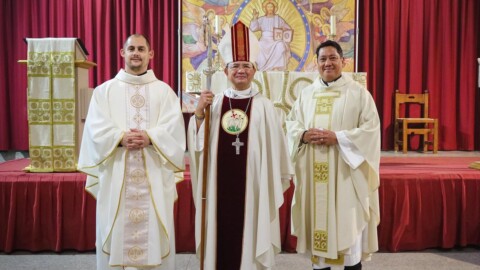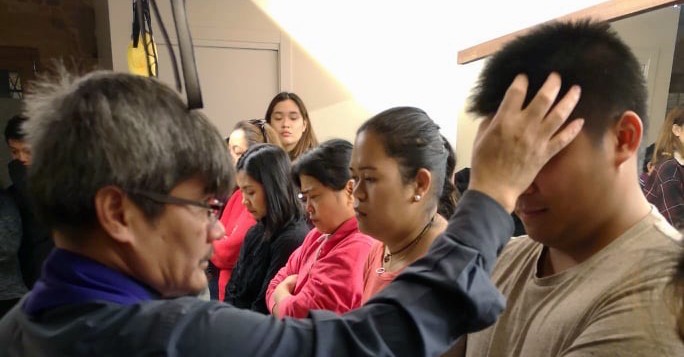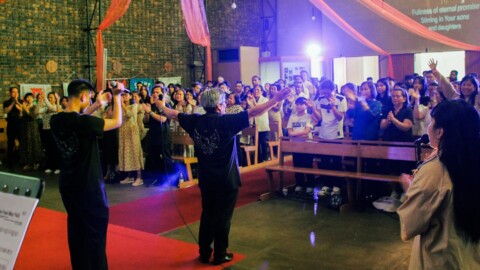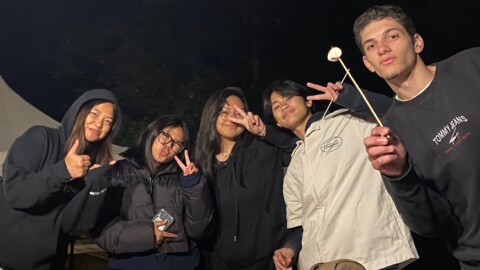REGENERATING THE SPIRITUAL BOND OF CHRISTIAN UNITY
INTRODUCTION
Romanticizing “Sunny Spain” could be an enticing description that draws “sun worshippers” from the colder regions of the northern hemisphere. Yet, the “dog days of summer” is no joke at all for the long-time denizens of this European country just a few hundred kilometers north of Africa.
Nevetheless, “heat” or “warmth” evokes a completely distinct sense if seen from a more positive spiritual perspective for it is a condition supernaturally generated by the “fire of love” that brings together in Christian unity those who have been called to share “the faith once delivered to the saints”.
Such was the “projectile” that gave impetus to conceive, plan and carry through toward its successful finale the ICCEC Leadership Training Seminar at the Residencia Miguel
Antonio Caro in Moncloa, Madrid on 12-14 August 2022.


This consummately organized event was well-attended by enthusiastic delegations from Paris (France), Cologne (Germany), Madrid, Barcelona, and Bilbao (Spain).

Being held in Madrid, it is just and fitting to heartily thank the parishioners of St John the Apostle for all the physical preparations and venue arrangements. Likewise, more heartfelt gratitude is worthily expressed to all the parishes of the CEC Diocese of Europe for their immeasurable support in terms of logistics and finances, particularly the individual members who selflessly shared their resources to sponsor the attendance of their less financially capable brothers and sisters.


THE SEMINAR’S CENTRAL THEME
Through the competent leadership and able guidance of His Grace, the Rev’d Elmer Belmonte, Bishop of the CEC Diocese of Europe, the entire Leadership Training Seminar zeroed in on the general theme of “How Should We Then Live in the Present Age of Secularism?” as inspired by the enduring thoughts found in the book of the same title–How Should We Then Live?–authored by the late twentieth-century American Christian theologian, philosopher, scholar, and pastor Francis Schaeffer whose comprehensive evaluation and penetrating critique of western civilization from the ancient Roman civilization to the emerging postmodern era of our time persistently challenge the roles and commitment of honest-to-goodness followers of the Lord Jesus Christ in the most critical moment of the current dispensation where we inextricably find ourselves.
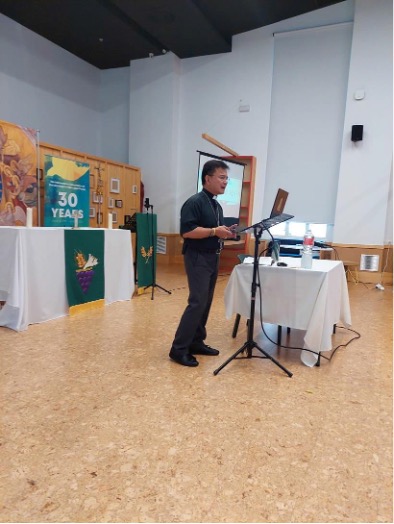
12 AUGUST 2022
FIRST DAY, PART ONE, LECTURE ONE: BISHOP ELMER BELMONTE
Day One of the Seminar–Friday, 11 August–commenced with a short praise and worship service. It was immediately followed by far-reaching and thought-provoking lectures respectively delivered by Bishop Elmer and Fr. Terry Gensemer, International Director of the US-based CEC for Life movement.
The initial lecture delivered by Bishop Elmer focused on the question of how should we Christians of the present generation live in this most critical era that has presented itself as a penetrating challenge to the very fiber of our faith. Confronted with the reality of present-day secularism, how do we stand firm and strong before its devastating power that has made its destructive inroad into the weakened dynamics of many so-called Christian churches of liberal mold? A misdirected trajectory has characterized many Christians nurtured in these churches where faith weakens and succumbs to worldly enticements as they seek true love in directionless adventures that lead to failures. At this point, it is important to realize how we distinguish between genuine Christianity from the nominal/cultural variety which is just a semblance of the former. Buttressed by the wisdom of what Jesus says in the Gospel of John chapter 8, verse 23–“You are from below; I am from above. You are of this world (aeon); I am not of this world (aeon).”–the challenge therefore is to follow the way of the Lord and be not OF the world (aeon) though we are IN the world (cosmos). Being members of Christ’s Body, the Church, we have to consistently affirm that we IN this world (cosmos) are NOT OF this world (aeon).
In this light, the good Bishop reminded all of us to be strongly guided by St. Augustine’s assurance that “to fall in love with God is the greatest romance; to seek him, the greatest adventure; to find him, the greatest achievement.”
To highlight the ideological seeds that have shaped the socio-cultural infrastructure of modern western civilization which is heavily characterized by secularism, Bishop Elmer appropriated the crucial message imparted by Kevin Swanson in his book, The Apostate.
Swanson lays down the fundamental claim that the destructive elements of secularism infiltrated prestigious European universities and this led to the slow and steady erosion of the Christian faith in major European centers of western civilization within a period of eight centuries.

But we should not lose heart as we tread along the dusty and rocky road of our present struggle with the inspirational message from the great Christian activist, Martin Luther King, Jr. who once said that,
Even the established Roman Catholic church has become a party to the spiritual decline of the West through the dichotomized knowledge propagated in the epistemology of St. Thomas Aquinas where he distinguished between secular/intellectual knowledge from spiritual/sacred knowledge by way of taking the path of Aristotelian dualism.
However, on a positive note, Swanson expresses his optimistic belief “that the Christian faith [will never] disappear from the Earth and the Kingdom of Jesus Christ will outlast every kingdom that has ever attempted to rule the world.”
And the persistent question that echoes Francis Schaeffer’s apprehension lingers: “How should we then live?”
FIRST DAY, PART ONE, LECTURE TWO: FR. TERRY GENSEMER
“We are leaders of our own lives”. This was how Fr. Terry encouragingly started his lecture. And these words really make absolute sense because day in, day out, we are confronted with circumstances wherein it is necessary to make decisions, big and small. It is the common stuff of life where the fundamental essence of leadership is tested and practised. Life is not a bed of roses as we confront obstacles every now and then and we need to face them head on and get them out of our way.
Leadership is a necessary factor to make changes in a world that hinders the way we walk on as we fulfill the responsibilities of Christian faith laid before us. It is therefore the power of such faith in Christ that enables us to effect whatever change we have to do to make this world a better place to live in. In this sense, each of us should realize the importance of our role as servant-leader as we take after the example of our Lord Jesus Christ who is our one and only model.
Fr. Terry shared in his talk two models of Christian leadership in the lives of two distinguished personalities who weaved their ways through difficulties and struggles and emerged victorious in the end. One is the Iraq war veteran Noah Galloway who suffered unimaginable mental, physical, and emotional pains and misery as horrible after-effects of the injuries he excruciatingly experienced in war. Overwhelmed by the power of God’s love towards the end of his suffering and struggle, Galloway’s victory transformed himself to become an inspiration to give hope and strength of mind to hopeless people suffering from whatever tragic experience they continue to entertain in their lives.
The following words are written towards the end of the hand-outs titled “No Excuses” distributed during Fr. Terry’s talk:
“Sergeant Noah Galloway, a Birmingham, Alabama native, is the personification of valor and resilience. This Purple Heart awardee, double amputee decided to join the military as a result of the September 11th terror attacks. However, his battles didn’t end in the field when he was forced to adapt to a life with only two limbs after an IED attack during Operation Iraqi Freedom which would take his left leg above the knee and his left arm above the elbow. Noah’s incredible journey to mental and physical wellness is one that he shares in his memoir titled, Living with No Excuses: The Remarkable Rebirth of an American Sodier. These words, “No Excuses,”became Noah’s mantra as he rose our of a post-trauma depression via his reinvigorating passion for fitness.”
The second story shared by Fr. Terry was that of the distinguished neurosurgeon Dr. Ben Carson who is presently the Director of Pediatric Neurosurgery at the prestigious Johns Hopkins Medical Center in Baltimore, Maryland, USA.
Through difficulties and hardships he suffered as one of African-American origin in a life of poverty from childhood and adolescence, Ben Carson has been transformed through the persistent Christian influence of his faithful mother from a person nurtured in a hostile environ dominated by racial discrimination and violence to become a successful medical practitioner with the distinction of being one of the best in the world in the field he chose to specialize.
Again, in the hand-outs titled “Ben Carson: ‘Gifted Hands’,”distributed during Fr. Terry talk, the following are written in conclusion:
“Ben and his family are committed Christians and Ben’s faith has been an important factor in his career. His mother’s motto was ‘Learn to do your best and God will do the rest’ and she passed this philosophy on to her sons. Ben is open about the fact that he frequently prays before he oeprates, asking God to guide him.”
Authentic leadership draws its power from God and it is through our faith in Him that such power is capable of changing the world.
Towards the end, Fr. Terry inculcated to us the five principles of effective Christian leadership as follows:
1. Having the heart of a servant.
2. Having the commitment of a problem-solver.
3. Having the peripheral vision to be aware of the surroundings.
4. Being an able time manager.
5. Being a tenacious visionary.
FIRST DAY, PART TWO, GROUP ACTIVITIES
The second part of the first day was devoted to group activities highlighted by a problem-solving session wherein participants were divided into groups and given real church-life problems to discuss and come up with probable and workable solutions.
Afterwards, ample time was given particularly to the young people to get into group games they were interested to play. To some, the swimming pool at the backyard of the venue was an inviting amenity on a hot summer day.
To sum up the day, the activities were not only focused on cerebral matters but true to the original plan, it was an engaging moment for individual participants and families to casually fellowship among each other and enjoy the friendly ambience of the venue. On top of everything were of course the sumptuous breakfast, lunch, and dinner meals.
13 AUGUST 2022
SECOND DAY, PART ONE, LECTURE ONE: BISHOP ELMER BELMONTE
Day Two of the Seminar–Saturday, 13 August–opened with a short praise and worship service.
The first lecture of the second day dwelt on a more detailed follow-up to the previous day’s initial lecture wherein Bishop Elmer continued to pursue the issue of how should we Christians live our lives meaningfully in the secular society we are in. In this connection, it is of the essence that we focus more on God’s plan for our lives and not get distracted by the worldly seduction and temptation we are constantly and relentlessly exposed.
In the present dispensation, we should never forget that we are in process of being prepared for a future state of being where there is greater happiness waiting for us. We therefore have to realize that there are myriad dangers in being caught amidst the lure of modern materialistic life.
In this light, one truth persists and that is the reality that beyond material gratifications, no lasting hope is ever possible.
Hope, according to the Christian apologist C.S. Lewis, is a theological virtue that continually looks forward to the eternal world while we do not actually negate the reality of the present moment as we find ourselves in the world. The persisting notion is, we are IN the world but we ought to make sure that we are not OF the world.
Furthermore, it is important to consider how C.S. Lewis punctuates such an important notion with the following words:
In conclusion, Bishop Elmer stressed the fact that all of these things can only be reached in the real world if we seriously take into consideration the important role of the Christian family in shaping the characters and strengthening the faith of its members. Over and above this is the commitment to the Gospel for such character-shaping and faith-strengthening efforts will never be successfully achieved unless the Word of God is brought at the forefront of a family’s faith journey. The enemy is not a figment of the imagination; it is real and there’s no room to relax and take the matter lightly. We cannot afford a breakdown in the family structure and let the enemy overtake us if we truly aim at winning the battle with God on our side. It should never slip out of our mind that the family is a “mini-church,” a microcosmic representation of His Kingdom.
SECOND DAY, PART ONE, LECTURE TWO: BISHOP ELMER BELMONTE
Bishop Elmer’s second lecture focused on the issue of Christian stewardship. We are God’s children and we have to continually affirm the reality that He will provide for our needs. Being God’s child is not living all alone in an isolated condition but being present with the other children of God. It is the concerted effort of His children working in unison for the glorification of His Kingdom that no one should suffer the poverty and loneliness of a life outside of His fold.
It is on this basis that we are being drawn to the solemn issue of Christian stewardship. There is nothing in this natural world that we own; everything is God’s. And if we have been generously blessed by the owner Himself of these bountiful riches, we are duty-bound to take the role of sharing the blessings for those in need. The Church is the representation of God’s Kingdom on earth and it is for His glorification that the ministries of the Church ought to go on with all the logistical and financial support of its capable members joined together as in God’s family.
At this point in time, Bishop Elmer joyfully broke the news in public that the Church in Cologne, Germany through the representation of its parish priest, Fr. German Historillo, had made the donation of 3,000 euros to add up to the Lighthouse Project funds intended to purchase a property for the construction of the church building of the Parish of St. John the Apostle in Madrid.
In summary, we have to be mindful that,


Again, C.S. Lewis reminds us that,

Finally from the words of the late distinguished Roman Catholic cleric, John Richard Neuhaus,

In God’s Kingdom, there’s no aimless wandering and unnecessary fooling around. The wind of faith cannot be controlled and stopped once it gets into motion. To quote the late ICCEC Patriach Randolph Adler,

In the Kingdom where we live and have our sustenance, the almighty power of God moves and no higher power can ever dominate over it.
SECOND DAY, PART TWO: FR. TERRY GENSEMER
As it was on the previous day, the second part of the second day of the Seminar was facilitated by Fr. Terry. It was again devoted to activities wherein real church-life problems were discussed and resolved by participants assigned in different groups.
It was once more a pleasant fellowshipping opportunity for stay-in participants as the busy day of activities ended.
4 AUGUST 2022
THIRD DAY, CELEBRATION OF THE HOLY EUCHARIST (ORDINARY TIME)
The Sunday Mass capped the seminar on its third and final day. It was not only attended by the seminar participants but by Church members who were not able to come on the previous two days due to the demand of their jobs.
Bishop Elmer’s homily was the culmination of the training seminar highlighting its main theme whose focal point is the question taken from the title of Francis Schaeffer’s monumental volume, How should we then live? Expanding the issue at
hand, we Christians are now brought face-to-face with the reality of living in this modern digital world. The question seems to be a perennial one asked by the Christians of the bygone era and is continued to be asked by present-day Christians and surely by the Christians of the future generations yet unborn.
Bishop Elmer’s homily is captured in the following resumé:
In the Epistle to the Hebrews, living the Christian life is carried out in our act of worship to God. The very essence of worship is presented as an act of approaching God, i.e., getting drawn closer to God. Yet, in this whole event, we Christians don’t come alone to God’s presence; we are joined by a company of angels and saints that have gone ahead of us. Hebrews 12.1 says “we are surrounded by such a great cloud of witnesses”. And then it also says that we are like running a race “marked out for us” and in such a situation, “perseverance” is of prime importance. It is likewise required that we should “throw off everything that hinders and the sin that so easily entangles” us while engaged in that race–while approaching and getting closer to God. This is how we should then live as Christians.
We have with us heroes of faith whose lasting legacy will always guide us in the race. One of them is Abraham who emerged victorious after his faith was severely tested. We could therefore have the assurance that with the same quality of faith, we will likewise make it. We have Moses and Joseph as heroes that won God’s favor because of their immense faithfulness.
St. Chrysostom was a paragon of Christian faithfulness amidst an environment characterized by poverty, violence, brutality and all sorts of difficulty. Yet over and above all of these hardships, he came out unblemished and faithful in the eyes of God to whom he dedicated the entirety of his life.
Unlike St. Chrysostom who experienced all sorts of persecution being a follower of Christ, we live a much easier life in the modern world. But the enemy Christian martyrs encountered in the past is the same enemy we have amidst us. Nothing of its character has changed except perhaps the way it presents itself. In this light, the Hebrew author points us to the same power that is able to defeat such an enemy and that power is none other than our Lord Jesus Christ.
Jesus is many things to many people but as Joseph Cardinal Ratzinger strongly points out, among everything that Jesus is being represented, one thing that uniquely stands out and hence non-negotiable is the reality that Jesus Christ is the Son of God. As the Son of God, Jesus did everything in his earthly ministry what the Father wanted Him to do. In all aspects of Jesus’ faith journey on earth, He was
always in communion with the Father. That is how an obedient Son acts and moves and does the will of the Father. By virtue of our faith in Jesus Christ as our Lord and Savior, God the Father has likewise granted us the right to be His children and be called His sons and daughters.
Jesus Christ, being the Son of God, is the consummate hero that should inspire us and lead us to the life we should live. What then becomes significant is emulating Jesus’ attitude towards the Father when he uttered, “Not my will but yours be done”.
Now that we have the Spirit of God in us, we have been given the right to call God, “Abba, Father”. We are children of God through His Son, Jesus Christ.
Bearing in mind the challenge of Pope John Paul II, “Let’s get going!” for the battle is not yet over.
We have with us a faithful God amidst a faithless world. In this situation, we need a faithful Church through which God’s will is fulfilled with faithfulness.
Let us therefore live as faithful children of God. This is how we should then live.
RFP_16/08/22







